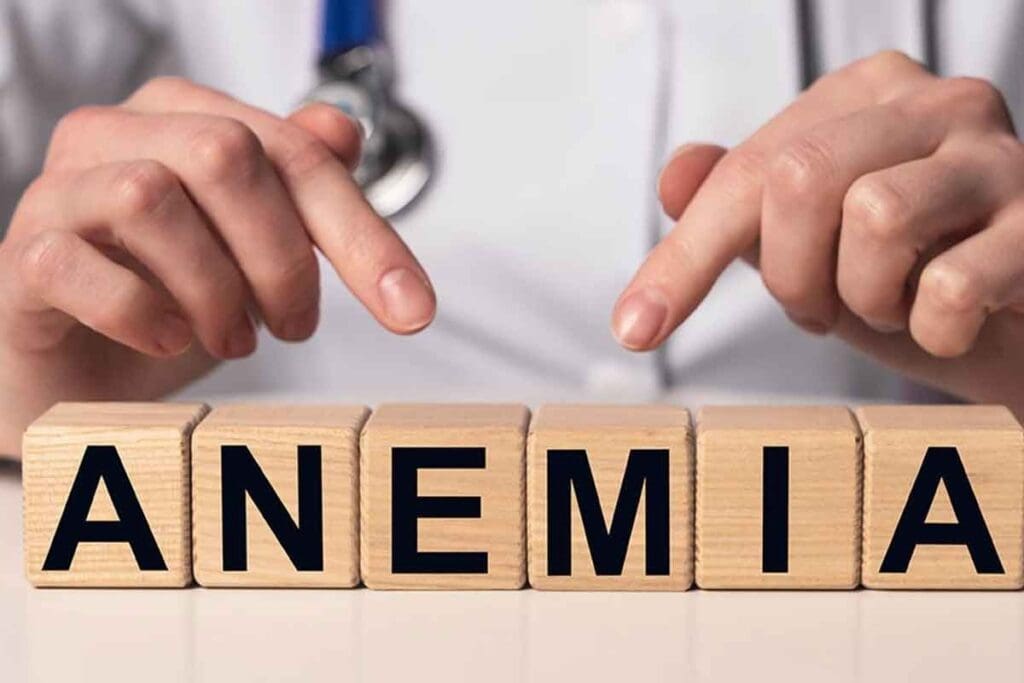Last Updated on November 14, 2025 by Ugurkan Demir

It’s important to understand how anemia and weight loss are connected. Anemia happens when there’s not enough red blood cells or hemoglobin. This can make you lose weight unintentionally because you might not feel like eating, feel tired, and your body’s metabolism changes.
Can anaemia cause weight loss? Iron deficiency anemia is a common type of anemia that can make you feel very tired and short of breath. This lack of energy makes it hard for your body to keep a healthy weight. Knowing the signs of anemia-related weight loss is key to getting medical help and avoiding more health problems.

Anemia is a condition where the body lacks enough red blood cells or hemoglobin. Hemoglobin is a protein that carries oxygen. This lack affects how well the body gets oxygen.
Anemia is classified based on the size of red blood cells and their hemoglobin. This helps doctors understand the cause and choose the right treatment. There are three main types: microcytic, normocytic, and macrocytic anemia.
Iron deficiency anemia is the most common type and can lead to weight loss. It happens when the body doesn’t have enough iron for hemoglobin. Vitamin deficiency anemia, caused by a lack of vitamin B12 or folate, can also affect weight.
Anemia affects people of all ages but some groups are at higher risk. Women, in particular, are more likely to get it due to menstrual blood loss. Other risk factors include a diet lacking essential nutrients, chronic diseases, and genetic disorders.
Knowing these risk factors is key to early diagnosis and treatment. This can greatly improve life quality for those with anemia.

Anemia and metabolism are closely linked. Anemia, caused by a lack of red blood cells or hemoglobin, affects how we use nutrients. This can change how our body works.
Oxygen is key for our body’s energy production. With anemia, less oxygen is available. This can lead to weight loss. Iron deficiency anemia is a big problem because it limits oxygen for our cells.
Anemia impacts our body’s energy use. It makes it hard for our body to produce energy. This can cause fatigue, a common symptom.
Iron is vital for making hemoglobin, which carries oxygen. Without enough iron, cells can’t make energy well. This leads to changes in metabolism and might cause weight loss.
| Metabolic Change | Effect on the Body |
| Reduced Oxygen Delivery | Impaired energy production, leading to fatigue |
| Increased Metabolic Rate | Potential for weight loss due to increased energy expenditure |
| Altered Nutrient Metabolism | Changes in how the body processes nutrients, potentially affecting weight |
Each type of anemia affects metabolism differently. For example, vitamin deficiency anemia impacts metabolism in ways iron deficiency anemia does not. Knowing these differences helps manage anemia’s effects.
Studies show anemia can cause weight loss. The Cleveland Clinic notes that iron deficiency can slow down metabolism. This leads to fatigue and weight loss.
Anemia is when you don’t have enough red blood cells or hemoglobin. It has been linked to weight loss in studies. This section will look at the scientific evidence. We will explore the research, how it works, and the numbers.
Many studies have looked at how anemia affects weight. They found that anemia can cause weight loss. This is because of less appetite and changes in how the body uses energy (Cleveland Clinic).
A study in the Journal of Clinical Biochemistry and Nutrition found weight loss in people with iron deficiency anemia. This was due to less appetite and poor nutrient absorption.
A cross-sectional study using data from the National Health and Nutrition Examination Survey (NHANES) found a link between anemia and weight loss in some groups.
The reasons for weight loss in anemia are complex. Reduced oxygen delivery to tissues is a key factor. It slows down metabolic processes and energy production. Hormonal imbalances also play a role, affecting appetite.
Studies show that ‘anaemia weight loss’ is mainly due to iron, B12, or folate deficiency. These deficiencies can slow down metabolism or affect how the body absorbs nutrients. For example, iron deficiency can lower thyroid function, which affects metabolic rate.
Research has also looked at how severe anemia is related to weight loss. A study found that more severe anemia leads to more weight loss.
| Anemia Severity | Average Weight Loss (%) |
| Mild | 5.2 |
| Moderate | 8.5 |
| Severe | 12.1 |
This table shows how severe anemia is linked to weight loss. It highlights the importance of early diagnosis and treatment to prevent nutritional deficiencies and metabolic problems.
Anemia makes it hard for the body to carry oxygen to tissues, which can lead to weight loss. This condition causes changes in how the body works.
Anemia means less oxygen gets to tissues and organs. This makes it hard for cells to make energy, as they need oxygen to do so. Without enough oxygen, tissues can’t work right, leading to weight loss.
The body reacts differently to less oxygen. Some people might feel tired, weak, and have trouble breathing. These symptoms can change how much they eat and how active they are, affecting their weight.
Anemia, like iron deficiency anemia, can mess with hormones. Iron is key for making and controlling hormones. For example, iron helps the thyroid work right, which is important for how fast we burn calories.
Studies from the Mayo Clinic show iron deficiency anemia can mess with hunger hormones. This can make people lose weight.
Anemia also affects how we feel hungry or full. Hormonal changes and the body’s response to less oxygen can play a part. Some people with anemia might eat less, which can lead to weight loss.
It’s important to understand how anemia affects weight. By fixing the cause of anemia and managing its effects, people can control their weight and health better.
Anemia can cause weight loss, and there are key signs to look out for. It’s a condition where you don’t have enough red blood cells or hemoglobin. This can lead to symptoms beyond just losing weight.
People with anemia often feel tired and unintentionally lose weight. They might also have fatigue, weakness, and pale skin. This is because their body’s tissues aren’t getting enough oxygen.
Fatigue is a big symptom because cells need oxygen to work right. This can really affect your daily life and how well you feel.
It’s important to know if weight loss is from anemia or something else. Look for symptoms specific to anemia. Here’s a table to help you tell the difference:
| Symptom | Anemia-Related Weight Loss | Other Causes of Weight Loss |
| Fatigue | Common due to reduced oxygen delivery | May or may not be present |
| Skin Color | Pale skin due to lack of hemoglobin | Variable, depending on the cause |
| Energy Levels | Generally decreased | Can vary widely |
If you’re losing weight without trying and feel tired, weak, or pale, see a doctor. They can run tests to see if anemia is the reason.
Getting diagnosed and treated early can really help. Knowing the signs and getting medical help can tackle anemia and its effects on your weight.
Iron deficiency anemia can greatly affect a person’s weight. This is because it impacts how the body uses energy. The body needs iron to make hemoglobin, which carries oxygen in red blood cells.
Iron is key for making thyroid hormones. These hormones help control how fast the body burns energy. Research shows iron deficiency can lower thyroid function, changing how fast the body burns energy and affecting weight.
The Cleveland Clinic says iron deficiency anemia can mess with thyroid function. This can change how much someone eats and their weight. It shows how iron, thyroid function, and weight are all connected.
Iron deficiency can also change how much someone wants to eat. Studies show people with iron deficiency anemia might eat less, leading to weight loss.
How iron affects appetite is complex. It involves many body processes. Making sure to get enough iron is key for a healthy appetite and nutrition.
Many case studies have looked at how iron deficiency anemia affects weight. These studies found some people lost a lot of weight because of it. This shows how iron deficiency can impact weight.
For example, a study might track a patient with iron deficiency anemia. They might see a lot of weight loss that matches the severity of the anemia. When iron levels go back up, weight changes can also reverse, showing anemia’s weight effects can be fixed.
Anemia affects weight in many ways, making it hard to say anemic people are always skinny. The link between anemia and weight is complex. It depends on the type and how severe the anemia is.
Anemic people don’t all look the same in terms of weight. Some might lose weight because they don’t feel like eating or can’t absorb nutrients well. But others might not see a big change in their weight.
Factors Influencing Weight:
Several things can affect how anemic people weigh. These include the cause of anemia, how severe it is, and any other health issues they might have.
| Factor | Impact on Weight |
| Nutritional deficiencies | Can lead to weight loss or poor weight gain |
| Chronic anemia | May result in gradual weight loss or stable weight |
| Acute anemia | Can cause sudden weight loss or no significant change |
Chronic anemia affects weight more slowly than acute anemia. Acute anemia can cause weight to drop quickly. Knowing these differences helps in managing anemia better.
Looking at how weight can vary and what affects it in anemia shows the stereotype is too simple. It’s not true that all anemic people are skinny.
When patients lose weight without a clear reason, doctors must think about anemia. Finding anemia involves blood tests and a detailed medical history.
Several blood tests are key to diagnosing anemia. These include:
These tests help doctors figure out the type and cause of anemia. For example, low hemoglobin and hematocrit mean anemia. Low ferritin points to iron deficiency.
More than just blood tests are needed to find anemia’s cause. These include:
When looking at anemia in unexplained weight loss, other weight loss causes must be ruled out. This includes:
A detailed differential diagnosis makes sure all weight loss causes are checked. This leads to the right diagnosis and treatment.
To fight anemia and its impact on weight, a balanced diet is key. A good nutrition plan is vital for managing anemia and keeping weight stable. It helps ease anemia symptoms and boosts overall health.
Iron, vitamin C, and other nutrients are essential for anemia management. Including iron-rich foods like red meat, poultry, fish, beans, and fortified cereals can boost iron levels. Vitamin C, found in citrus fruits, bell peppers, and tomatoes, helps iron absorption when eaten with iron-rich foods.
Other important nutrients include folate in leafy greens and legumes, and vitamin B12 in animal products and fortified plant-based milk. Getting enough of these nutrients is critical for treating anemia.
Good meal planning is vital for managing anemia and stabilizing weight. Eating a balanced diet with a variety of whole foods is essential. Avoiding tea and coffee with meals is also important, as they can reduce iron absorption.
Plan meals around iron-rich foods and vitamin C sources to improve nutrient absorption. For instance, having orange juice with fortified cereal for breakfast can increase iron intake.
| Food Group | Examples | Nutritional Benefit |
| Iron-rich Foods | Red meat, beans, fortified cereals | Improves iron levels |
| Vitamin C Sources | Citrus fruits, bell peppers, tomatoes | Enhances iron absorption |
| Folate-rich Foods | Leafy greens, legumes | Supports red blood cell production |
Sometimes, just changing your diet isn’t enough to fight anemia, and supplements may be needed. Iron, folate, and vitamin B12 supplements can help with deficiency symptoms. But, always talk to a healthcare provider before starting any supplements.
Medical nutrition therapy, guided by a healthcare professional or registered dietitian, offers personalized nutrition plans. This can be very helpful for managing anemia and stabilizing weight.
Anemia and weight have a complex relationship. It can lead to either weight loss or gain. Anemia can cause weight loss because of poor nutrient absorption, less appetite, and higher metabolism.
Iron-deficiency anemia is more likely to cause weight loss. To manage anemia well, a complete plan is needed. This includes good nutrition and medical treatment, as the Cleveland Clinic’s guidelines suggest.
For those losing weight due to anemia, eating small, nutrient-rich meals is helpful. Adding iron-rich foods to your diet is also good.
By focusing on overall health, people can handle anemia better. Places like Liv Hospital show the value of modern care and learning. They remind us to get medical advice for our specific needs.
Yes, anemia can lead to weight loss. This is because it reduces oxygen to tissues. It also affects hormones and appetite.
Iron deficiency anemia, vitamin deficiency anemia, and anemia of chronic disease can affect weight.
Iron deficiency can harm thyroid function. This changes metabolic rate, affecting weight.
No, anemic people can have different weights. Being skinny is not a sign of anemia.
Yes, losing weight quickly can cause anemia. This is true if the diet lacks essential nutrients like iron.
Signs include fatigue, weakness, and pale skin. Shortness of breath and other symptoms are also important.
Diagnosis involves blood tests like complete blood count (CBC) and iron tests. Other tests may also be needed.
Yes, anemia can cause weight loss even with enough food. This is due to poor nutrient use and metabolic changes.
Iron deficiency can change appetite. This can affect food intake and lead to weight loss.
Nutritional management includes eating foods rich in key nutrients. Meal planning and supplements can also help recover and stabilize weight.
Weight loss in anemia varies. It depends on anemia’s severity and type, and individual factors.
Yes, anemia can cause weight loss in children. It can also affect their growth and development.
Subscribe to our e-newsletter to stay informed about the latest innovations in the world of health and exclusive offers!